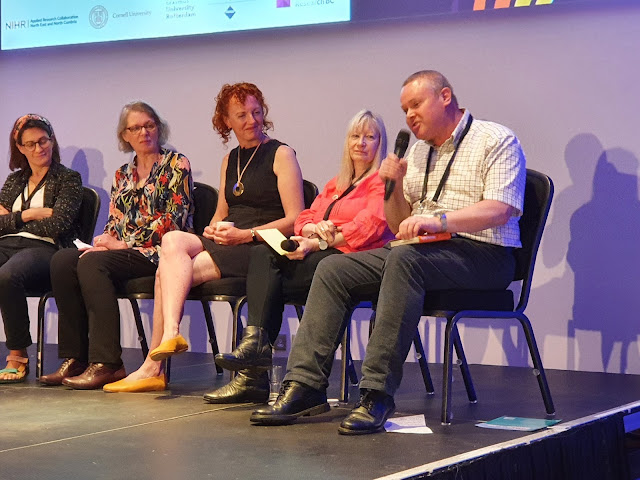Amelia Lake, Fuse Associate Director, and Helen Moore, Fuse Associate, at Teesside University are bucking this trend. Both work in senior level roles in public health research, leading teams and both work part-time.
Amelia and Helen were two of the senior leaders I interviewed when writing my book Solving the Part-Time Puzzle: How to decrease your hours, increase your impact, and thrive in your part-time role. They shared their stories about how they make their part-time arrangements work, and the benefits they experience from working in this way.
 |
| Helen Moore (left) and Amelia Lake (right) both work part-time in public health research |
“During the pandemic, and post-pandemic, childcare has been difficult to access, and being part-time means some days of the week can be less stressful in terms of childcare. Working part-time means I work even more collaboratively with colleagues as their support when I am not at work is important. It can be hard to switch off emails and alerts on non-working days, and I don’t always do it, but I know it is important.”
Helen said, “It was, and is, important for me, as the primary carer of young children (I have two sets of twins) with a husband who works away in the Merchant Navy, to be able to have some flexibility around when and how I work. This supports me in being able to take them to, and pick them up from, school several days of the week, and to not have to rely all of the time on either family help (which can feel like an imposition) or paid childcare (which is both expensive and difficult to find when you have four children).”
So why is it so rare to see senior leaders working part-time? Largely because there’s an embedded belief that senior leadership roles are the most challenging to do part-time. Many people will tell you it’s impossible – and that it’s not even worth attempting.
Stories of leaders like Amelia and Helen are hugely important, because we badly need more senior leaders leading the way and working part-time. When senior leaders do so it demonstrates to others that part-time work is acceptable and encouraged, and that it’s possible to keep growing a career while working part-time.
The individual and family wellbeing benefits are quite clear, and should be reason enough for organisations to start creating more part-time work opportunities. But the reality is that more encouragement may be required.
The good news is that there are some other big reasons for organisations to get on board with this.
A clear and highly relevant advantage for employers is talent attraction and retention. In the context of the ‘great resignation’ of 2022 this is a critical consideration for organisations looking to find creative ways to solve the talent shortage.
Firstly, it allows employers to retain their talented people who reach a point where they want or need to work part-time.
In Amelia’s words, “We need to see more people in leadership roles working part-time. I was promoted to Professor in my part-time working pattern which illustrates that it is possible to do high quality impactful work building capacity and also doing research, while working part-time. Teesside University has both promoted me and supported me in my part-time role.”
It also enables employers to tap into a hidden talent pool of highly qualified people who either can’t or choose not to work full-time. They include people with caring responsibilities, people with health issues, and people at retirement age who would stay in the workforce longer if given the opportunity to work part-time.
Helen said, “I strongly believe that working part-time doesn’t equate to a reduction in performance, and that it is demonstrated by my promotion to Associate Professor and being one of two Teesside University Star Award Research Excellence finalists in 2021.
“Being supported by Teesside University to work part-time in a senior role enables me to both lead the work of the University’s successful Evaluation and Impact Team, and to be able to be present and care for my four children.
“Having managers who were willing to try something new, even take a risk, and recruit a person to work part-time hours to establish and lead a new team has paid off and worked well – it has enabled me to grow significantly as both a researcher and a research leader.
“Roles similar to mine which I have previously considered, have been strictly full-time hours only, and did not feel open to someone with other commitments like me. There are a lot of talented people who for various reasons would like to work less than full-time hours, and I’m hopeful that my experience shows it is possible.”
This is also, of course, about inclusion. The consulting firm Timewise warns that if a company’s diversity, equity and inclusion (DEI) programmes aren’t underpinned by a commitment to flexible working that includes part-time, they will struggle to be fully inclusive. 'This will not only have a negative impact on their gender pay gap, but is also likely to impact their employer brand'
As well as the talent related benefits, there are also productivity benefits to be reaped by organisations who are willing to introduce more part-time roles. Organisation for Economic Co-operation and Development (OECD) data confirms that productivity (defined as output per working hour) improves with shorter hours. Across the world’s richest countries, higher productivity correlates with lower working hours.
The power and potential of part-time work really is huge. It can be a game changer for families and a smart people strategy for organisations.







.jpg)